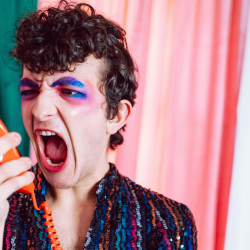Last night, I was watching TV with my wife, when suddenly, she started laughing out loud
She brandished her phone at me to show the latest social post that had tickled her, saying: ‘You have to see this! It’s so funny.‘ It happens every night for us, a scenario that plays out daily in millions of households across the world.
On the telly, there were Christmas ads that raised a smile too, as festive spots this year have definitely pivoted toward humour and away from purpose, from the Tesco ad with dads turning into Christmas trees to the embarrassment of their eye-rolling teens in the UK, to John Travolta strutting his stuff dressed as Santa for Capital One in the US.
After all, humour has always been a force to be reckoned with in advertising, and with everything that’s going on in the world right now, we’re all looking for positivity. Humour is one thing we’ve always used to share knowledge, experiences, and to help us cope with life. It’s no joke that laughter is the best medicine, with humour scientifically proven to improve mood and connect us.
As a result, humour is shareable on a very primal level. After a long time of such a heavy focus on purpose with humour taking a backseat, with life continuing to be tough for us all, it’s refreshing to see the rising return to a funny and witty approach. So it raised a wry smile when I saw that the Cannes Lions International Festival of Creativity has introduced a humour category for 2024. I first saw this in trend forecasts about three years ago, mid-pandemic: Humour and positivity were going to be a big thing in the market, and I’ve been talking about it ever since. From an ad point of view, we know that the industry is driving towards shareable experiences and we’re always looking for fame to drive awareness and sales — and humour drives fame. Whenever we measure our shareable content, humour has always been one of the top three ways to engage and ultimately drive awareness and sales.
The rise of humour over purpose in brand comms is therefore no surprise
The new Cannes acknowledgement of humour does have an element of playing catch up, not least after the ‘TikTokification’ of everything. The creator economy is now built on entertainment, and social media in general, is going in a direction where it’s much more about entertainment than it is about connections. Brands need to understand that we’re in a space where you’re competing with not just friends and followers; you’re competing with content creators and other brands that know how to entertain. And one of the fundamental ways of entertaining people is humour. Plus, great emotionally driven storytelling often equals humour.
But purpose and humour aren’t mutually exclusive — it doesn’t have to be either or. You can do both if you do things well. Although maybe some brands should ditch purpose — you don’t necessarily want to see messaging about positive societal change from your detergent brand — it’s just not a thing I need as a consumer. I just want to get my clothes clean. That’s not to say purpose can’t work, a growing volume of consumers want to buy low-impact products in general, but they’re happier to see it in product/packaging innovation on the shelf than through advertising.
At the end of the day, the new humour category is more than welcome
In crowded categories where purposeful ads have been pulling at people’s heartstrings, it is understandable that judges might not want to be seen picking a funny ad over a purpose-driven one. Giving humour its own section will serve to take this moral dilemma away. However, it’s important that the judging panel is age diverse. At Kubbco we work on a lot of campaigns targeted at Gen Z, and we know first-hand how unique their sense of humour is. It would be unfair to have a group of 50-year-olds judging a humour campaign geared towards Gen Z, as they simply won’t get the jokes.
The reverse is also true, of course. Younger audiences might not appreciate my dad jokes as much as my contemporaries. But hopefully, the creation of this new awards category can work as an incentive for agencies to lighten things up, and get creative in developing funny and witty ads that also serve to connect with people. Because it’s a misconception that ads need to be purposeful to build connections with an audience. Humour done well can also make people feel things. It can work as a conversation starter, entertain, and help people momentarily forget the weight of everything that is going on in the world.
It’s not that we want the world to move in a more goofy direction. It’s simply because though we as human beings all need to navigate the world together in our own personal way, humour can be universal.
So I love seeing humour now being taken seriously in the industry. I think that can put a smile on all our faces.
Featured image: Suzy Hazelwood / Pexels































